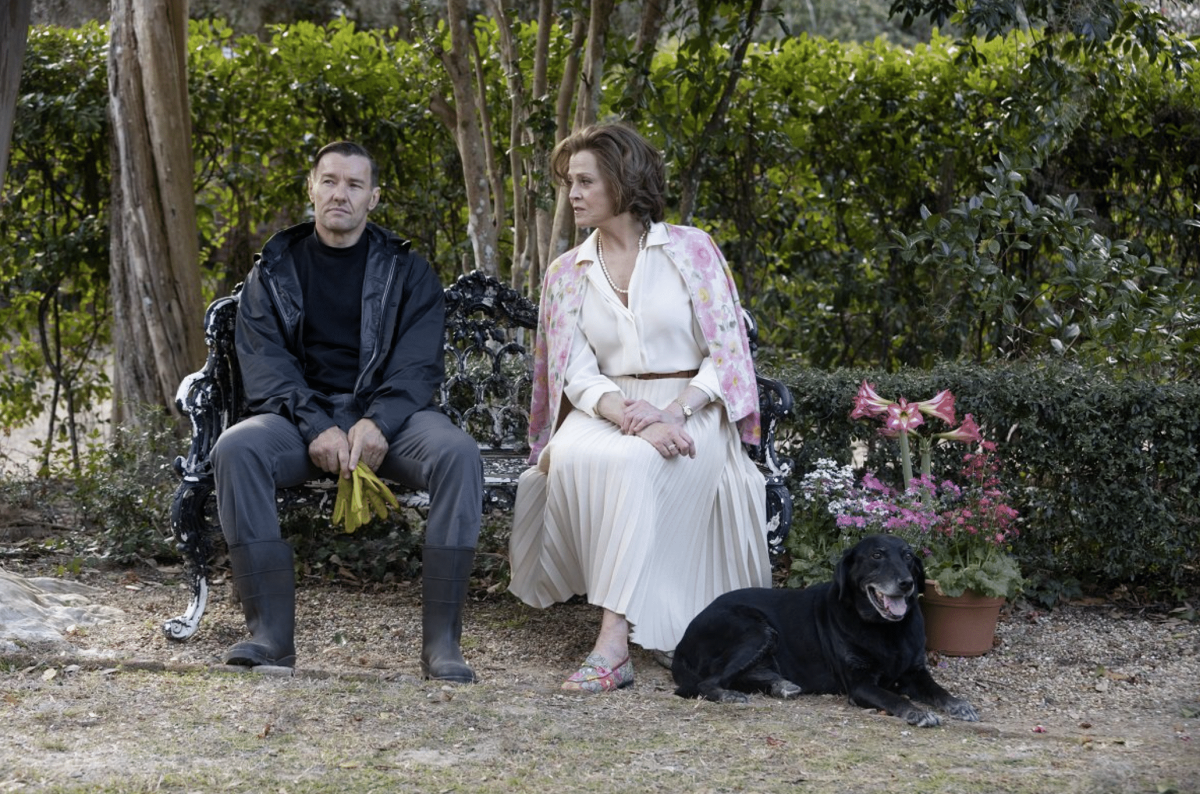Paul Schrader’s latest film is his third, after First Reformed and The Card Counter, in a loose late-career trilogy about troubled men whose moral conscience sees them turn – or return – to violence.
Throughout Schrader’s career as a screenwriter and director, he’s also been interested in individuals who find themselves caught between corrupt social institutions – politics, law and order, business, religion, the military – and criminalised demimondes such as sex work, gambling, drug dealing, far-right militias and radical-left activism. Such concerns find their best expression through the noir genre. But while Master Gardener vibrates with tension, it’s more of a relationship drama than a thriller.
Its chiaroscuro interior scenes, its use of dreams and flashbacks, and the watchful, self-contained presence of Joel Edgerton also reminded me of Thomas M Wright’s brilliant The Stranger from 2022 – but Master Gardener doesn’t have that film’s abstracted formalism.
To take up the distinction made in voiceover by the title character Narvel Roth (Edgerton), this film is not a French ‘formal garden’ of geometric patterns and symmetries, but rather an English ‘informal garden’ of winding paths and gentle slopes. It’s still deliberately made, but the effect is self-consciously naturalistic.
Hotbed
If you’re expecting fast-paced action, you may be disappointed; but I enjoyed pondering Schrader’s central irony: that gardening seems like a peaceful domestic pursuit but it also contains and even displays violence. After all, the expression ‘hotbed’, meaning a situation that produces something unwelcome and threatening, comes from the practice of raising plants quickly or out of season using the fermentation from a bed of manure.
Also deeply embedded here is American racism. Years earlier, as a leading member of a white supremacist militia, Narvel was trusted to ‘pull out the weeds’ – that is, to murder the group’s racial enemies. Having testified against his former associates, he has cultivated a new life under witness protection.
Now he tends to Gracewood Gardens, a public tourist attraction on wealthy socialite Norma Haverhill’s (Sigourney Weaver) inherited family estate – whose white neoclassical columns and wide porch unmistakably mark it as a former slave-owning plantation. He lives monkishly in an onsite cabin filled with horticulture books, where he writes a strangely erudite, lyrical private journal.
Conscious of her mortality, Norma summons Narvel to her porch where she asks that he take on her grandniece Maya (Quintessa Swindell) as an apprentice, so Gracewood Gardens will remain in the family. ‘She’s mixed blood,’ Norma notes archly, adding that Maya has ‘lifestyle issues’, having fallen in with a bad crowd after her mother’s death.
While Maya is initially skeptical and defensive, she begins to thrive at Gracewood – a seedling transplanted into rich loam – while Norma finds her ‘impertinent’ because she refuses to be ashamed of herself or her parents. Narvel is caught in their battle of wills: ‘I’m not sure what it is about these two women, Norma and her grandniece,’ he writes in his journal. ‘I’m not sure I want to know.’
But when Maya’s old life catches up with her, Narvel reaches out to an old law-enforcement handler (Esai Morales) to help protect her. In awakening his old self, he risks everything: his satisfying job, his safety from old enemies, and Maya’s good opinion.
Power relations
So far, so clichéd, right? But Master Gardener is interesting because of the racialised power relations it grafts onto the rootstock of ‘retired warrior reluctantly picks up his sword again’.
Narvel describes gardening as ‘a belief in the future’, and it’s clear that he wants to mulch his misdeeds. Formerly hothoused to hate and kill, he now hopes for redemption through helping plants flourish and protecting them from pests.
But Norma is deeply invested in tradition. She revels in the soft power she wields as mistress of Gracewood, where the meditative care Narvel takes in cultivating plants is uncomfortably complicit with Norma’s eugenic ideologies of purity and perfection.
Schrader makes sure we notice that Narvel’s cabin is a miniature version of the main mansion, and that he greets and thanks the other staff by their first names, while they call him ‘Mr Roth’. Norma never allows Narvel to forget that any authority he wields depends on her favours – and she seems attracted to him because of his past.
Schrader returns here to a fraught sexual power dynamic that he’s previously explored in films such as American Gigolo and The Walker. While we’ve seen Edgerton give this kind of taciturn, gestural performance before, Weaver manages to be mannered without being cartoonish. Norma – surely the Sunset Boulevard reference is deliberate – is imperious, generous when she feels indulged, and peevish when she feels she isn’t … which she quickly does once Maya arrives.
Simmering
This film simmers with the horticultural potential for violence, just as a seed waits for the right conditions to explode into a plant; as gardening implements hang on a greenhouse wall like swords and guns; as spent flower petals fall on a path to be trampled underfoot; or as secateurs can equally prune a branch or sever a finger.
But I found it strangely – touchingly – optimistic. Maya represents a new locus of power that offers Narvel actual liberation, and Swindell plays Maya with quiet moral strength, not as a femme fatale or a damsel in distress. Her performance reveals the reason Maya unbalances Narvel – because their relationship is not transactional.
While other Schrader protagonists fatalistically sacrifice themselves, Narvel dreams he is laughing in amazement as a magical garden grows around him. ‘Plants rejuvenate,’ he tells Norma. ‘That’s what they do. Like us.’
Master Gardener is in cinemas from 7 December.
Actors:
Joel Edgerton, Sigourney Weaver, Quintessa Swindell, Esai Morales
Director:
Paul Schrader
Format: Movie
Country: USA
Release: 07 December 2023





